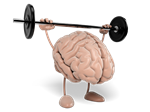
Best Ways To Protect Your Brain From Deterioration
Neurons are the basic units of the brain and they are responsible for passing on information from one part of the brain to the other. When they are functioning improperly some important brain functions such as memory, vision, and balance will be equally affected. Because the brain is tasked with controlling functions that are necessary for living it is important to ensure that neurons are adequately shielded from damage.
What Causes Neuronal Damage?
A couple of factors may contribute to damage to the neurons. They include: accumulation of toxins, build up of proteins, genetic errors, brain injury, mitochondrial dysfunction, inflammation, and other similar factors. Some factors may cause brain cells to deteriorate or fail to function adequately; in this case measures need to be instituted to prevent further damage and loss of function.
What is Neuroprotection?
This refers to the mechanisms through which neurons are preserved and shielded from injury or irreversible damage. This is done to prevent a breakdown of the central nervous system. At most times, neuroprotection efforts are geared towards preventing further damage to the neurons as opposed to reversing the damage that has already been caused. But current research is finding ways through which damaged neurons can be triggered to recover their function while dead neurons can be replaced through neurogenesis. Science has shown that the brain has the capacity to heal itself when the right environment is created. To what extent this is true is debatable, but numerous patients with signs of irreversible brain damage have been able to recover brain function, much to the astonishment of their care givers.
Neuroprotection can take two approaches; a pharmaceutical approach or a non pharmaceutical approach.
Pharmaceutical Approach To Neuroprotection
The pharmaceutical approach involves taking medication that will alter the neuronal process in a way that can protect brain cells from further damage.
1. Glutamate Blockers
When neurons are over stimulated/ excited to fire randomly they may start to degenerate. Glutamate is needed for normal cell functioning and can prevent neurons from getting over excited. Drugs such as Amantadine are glutamate blockers and they have been used to treat Parkinson’s disease. But these drugs come with severe side effects such as loss of vision, blurred vision and swelling of the feet.
2. Anti- inflammatory agents
Inflammation can also contribute to degeneration of neurons. Taking junior aspirin has been helpful for patient with Alzheimer’s disease.
3. Stimulants
Studies have shown that caffeine protects the brain from toxins that may build up in the brain. Caffeine can be used to prevent the damage caused by Parkinson’s disease.
4. Gene therapy
Some degenerative diseases occur as a result of genetic mutations. In this case, gene therapy is used to reverse symptoms of neurodegeneration.
Non-Pharmacological Approach
This involves the different activities that we can do to protect neurons from getting damaged. They include:
1. Regular exercise
Regular exercise will ensure that the brain is adequately furnished with oxygen and nutrients that are critical for the survival of brain neurons. When the brain is deprived of these essential components degeneration of brain cells is prone to happen. The brain cannot survive for more than 6 minutes without oxygen.
2. Eat plenty of neuroprotective foods
There are a good number of foods that have been branded “brain foods” because of the role they play in protecting neurons. Foods rich in omega oils are good for the brain. Additionally, some herbal extracts such as ginseng and curcumin are also needed for brain development.
3. Get adequate sleep
Sleep disorders have been linked to Alzheimer’s disease. A recent study also linked lack of sleep in people beyond 60 years to brain shrinkage.
4. Use of Cannabinoids
Cannabinoids are compounds found in hemp, cannabis as well as some other plants and insects. Cannabinoids interact with cannabinoid receptors to influence different functions in the body. The CB1 receptor is found primarily in the brain. Science has shown that the CB1 receptor plays a big role in protecting neurons from severe insults that may be arise when neurons are over stimulated.
